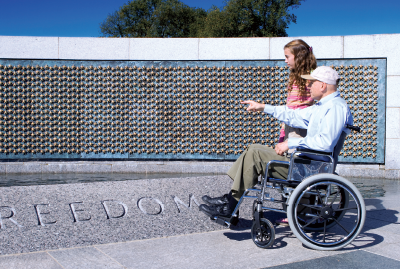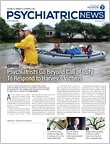Rates of posttraumatic stress disorder (PTSD) are higher in U.S. military veterans than in the general U.S. population. Reported rates of PTSD in veterans who served in Vietnam, the Gulf War, and Operation Enduring Freedom/Operation Iraqi Freedom range from about 15 percent to 12 percent to 14 percent, respectively. By comparison, the lifetime prevalence of PTSD among adult Americans is estimated to be about 7 percent.
According to Thomas Mellman, M.D., a professor of psychiatry and director of the Center for Clinical and Translational Research and Stress/Sleep Studies at Howard University College of Medicine, sleep disturbances are among the most persistent symptoms of PTSD. New research findings can help to expand understanding of disturbed sleep’s contribution to the onset and maintenance of psychiatric distress in veterans, said Mellman, who chaired a session on PTSD, other psychiatric disorders, and sleep at the joint annual meeting of the American Academy of Sleep Medicine and Sleep Research Society in Boston in June.
Recent studies suggest that insomnia may increase the risk of suicide. A study reported in the Journal of Clinical Psychiatry in June, for example, found that sleep disturbances predicted acute suicidal ideation symptom changes in young adults with a history of suicidal thoughts or actions.
In a separate study, Kelly Zuromski, Ph.D., a postdoctoral fellow in the Department of Psychology at Harvard University, and colleagues at the Medical University of South Carolina, assessed sleep and mood in 383 current and former nontreatment-seeking military personnel who responded to social and print media ads recruiting study participants who had recently thought about or attempted suicide. The Department of Defense (DoD) funded the study.
The researchers collected sleep and mood data at baseline and via an online survey one, three, six, and 12 months later.
Individuals with severe insomnia, as indicated by a high score on the Insomnia Severity Index—a standard symptom checklist—were more likely to have higher suicidal ideation, Zuromski said. The researchers found no evidence of insomnia preceding suicidal ideation in the infrequent time intervals they studied, however. Daily, or even hourly mood assessments, which could be obtained with data collection apps, Zuromski said, may be necessary to obtain information on whether insomnia or suicidal ideation comes first.
People with PTSD often have heightened fear reactions and re-experience traumatic events in the daytime, said Laura D. Straus, Ph.D., a postdoctoral fellow at the San Francisco VA Medical Center. Disruptions of sleep, particularly REM sleep, the state thought critical for emotional learning, may help perpetuate these symptoms, she said.
Straus and colleagues at the VA San Diego Health Care System assessed the ability of 15 veterans with PTSD to distinguish between safety and threat signals, using a computer to present images of yellow and blue circles. The researchers paired blue circles with a “threat,” an air puff to the throat. The researchers measured the veterans’ startle response on hearing accompanying noises as an objective measure of their anxiety. The veterans spent three nights in the sleep laboratory.
Veterans who had learned to distinguish the safety from the threat signals most successfully had more consolidated REM sleep, Straus said. Those veterans also had a lower startle response to the noise in the presence of the safety signal at a subsequent testing session. Treating sleep disruption, Straus suggested, may enhance veterans’ response to exposure-based PTSD treatment.
Veterans with PTSD also often report recurrent deployment-related nightmares.
Richard J. Ross, M.D., Ph.D., a professor of psychiatry at the Perelman School of Medicine at the University of Pennsylvania and the Crescenz VA Medical Center, Philadelphia, and colleagues assigned 94 veterans (68 had mild or moderate traumatic brain injury [TBI]) to participate in six weekly individual therapy sessions, where they received components of cognitive-behavioral therapy for insomnia (CBT-I). Half of these participants were also assigned to receive instruction in imagery rehearsal (IR) therapy, which involves rescripting, that is, imagining a better story outcome for a recurrent nightmare while awake, and mentally rehearsing the new dream script at bedtime.
At the start of the trial, all participants underwent a battery of neuropsychiatric tests, which assessed attention, executive functioning, learning and memory, and visuospatial processing. They also completed the Nightmare Distress Questionnaire, Nightmare Frequency Questionnaire, and Pittsburgh Sleep Quality Index to assess nightmares and sleep pre- and post-treatment.
At six-month follow-up, both groups reported better sleep and fewer nightmares. IR therapy offered no additional benefit. While veterans with TBI had greater nightmare distress and sleep disturbance, Ross said, they were able to benefit from treatment.
Individuals with better verbal memory functioning at baseline improved the most across the two sleep interventions. Further research is needed, Ross said, to verify the utility of assessing verbal memory functioning before implementing cognitive therapy for PTSD.
The researchers plan further studies to examine the pathways by which cognitive functioning affects treatment outcome. ■
An abstract of “Objectively Assessed Sleep Variability as an Acute Warning Sign of Suicidal Ideation in a Longitudinal Evaluation of Young Adults at High Suicide Risk” can be accessed
here.

